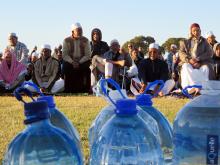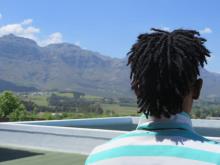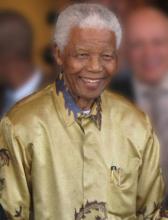Cape Town

Government officials have provided scant details for Day Zero logistics. Rather than communicate a clear plan of action, some are invoking fear with comparisons to World War II and 9/11.

Perhaps climate change’s calamities will galvanize the international political scene, cracking the iron grip of the wealthy on our politics and forcing redistribution of resources. But no matter what happens, people of faith must lead the charge in envisioning a just world for all inhabitants. To slow the destruction of the earth, a fundamental reimagining of our societies is required.

Amazigh was one of 125 queer Muslim activists and allies who came together for The Inner Circle’s seven-day Annual International Retreat, from Oct. 14 to Oct. 21, in South Africa. The gathering focused on “building a movement towards an all-inclusive and compassion-centered Islam,” a mammoth task for attendees like Amazigh who live in countries where homosexuality and transgender expression are often taboo and criminalized.
IN JUNE 1966, Sen. Robert Kennedy joined the National Union of South African Students for a conference held in Cape Town. Tension was running high. NUSAS president Ian Robertson had been banned under the Suppression of Communism Act, and the pressure was on Kennedy, from both the apartheid government and sectors of the anti-apartheid movement, not to attend.
Kennedy went anyway and delivered one of the best speeches of his career. “Few have the greatness to bend history itself,” Kennedy reminded the students. “But each time a [person] stands up for an ideal, or acts to improve the lot of others, or strikes out against injustice, [s/he] sends forth a tiny ripple of hope ... daring those ripples to build a current which can sweep down the mightiest walls of oppression and resistance.”
Twenty-eight years later Nelson Mandela became the first democratically elected president of South Africa. The West embraced him, celebrating his magnanimity, “disremembering” the support it gave to the very apartheid regime Mandela worked to dismantle.

Nelson Mandela, the former South African president who died Thursday, had a deep connection with religious institutions.
Mandela was educated, first at Clarkebury and then at Healdtown, Methodist boarding schools that provided a Christian liberal arts education.
“Both were important influences on his life,” said Presiding Bishop Zipho Siwa of the Methodist Church of Southern Africa. “Indeed, after his time at Clarkebury, the young Mandela said his horizons had been broadened.”
In Cape Town, retired Anglican Archbishop Desmond Tutu said Mandela was mourned by South Africans, Africans, and the international community as a colossus of unimpeachable moral character and integrity.
“He preached a gospel of forgiveness and reconciliation,” Tutu wrote in a tribute on Allafrica.com.
"THE LORD ANSWER YOU in the day of trouble! The name of God protect you!...Some boast of chariots, and some of horses; but we boast of the name of the Lord our God. They will collapse and fall; but we shall rise and stand upright."
Allan Boesak Jr., age 9, read slowly from Psalm 20 at the conclusion of the family dinner. The words that appeared in the lectionary reading that night were particularly poignant. Just the day before, Allan's father had publicly announced to a packed cathedral that the Botha regime had signed its own death warrant.
Three nights before that, a large brick came flying through the Boesaks' living room window, sending shattered glass in all directions; a death threat over the phone followed. Allan Jr. and his 12-year-old sister, Pulane, had decided to sleep on the floor of the large walk-in closet in their parents' bedroom for a few nights, while a group of theology students kept watch through the night outside the house.
But conversation at the dinner table that evening was anything but somber. In spite of the threats that surrounded it, the Boesak home was full of joy and life. There was fear, to be sure, but laughter was a more frequent expression.
What I remember most about that evening, our second in South Africa, was not the spicy curry or the swelling background music of "Mozart's Hornpipe Concerto," but the faces around the table—the delight on Pulane's, mirrored in her father's; the compassion in Dorothy's; and the warmth from Leineke and Belen. But especially the intent look on Allan Jr.'s face as he read from the psalm the promises of God to us all in a difficult time.